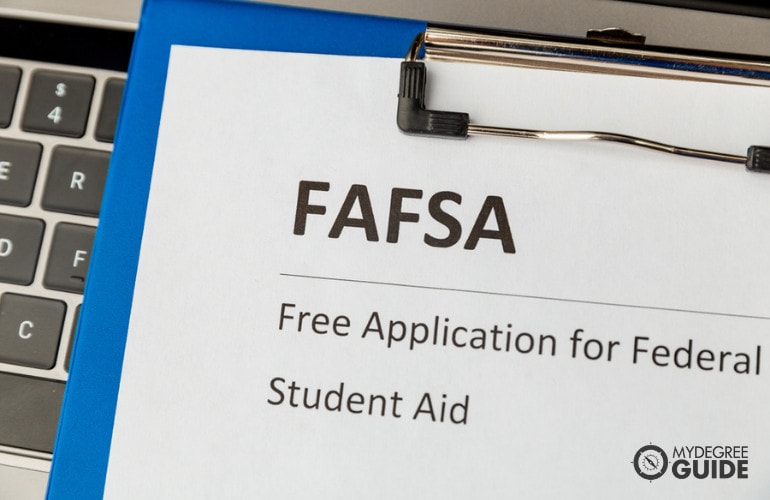If you’ve ever thought, “I have a lot of college credits but no degree,” you’re not alone.

Needing to pause your education is common and can happen for a number of reasons, whether related to financial costs, life demands, or perhaps being in a program that no longer feels suited to your career goals.
Editorial Listing ShortCode:
If you’ve collected a bunch of college credits but haven’t obtained an official degree, you may be able to leverage those credits into a bachelor’s program. This may allow you to complete your degree in less time rather than starting from scratch.
I Have a Lot of College Credits but No Degree

There are a number of reasons why students might complete college credits without obtaining a degree. These reasons may range from the high cost of education to changing life demands that required time and attention to be taken away from studies.
Costs related to pursuing a degree, such as fees and tuition costs, can sometimes be a heavy burden that causes students to take a break from their studies.
In many cases, a full-time course load, or even a part-time course load, may result in students being unable to maintain regular work hours, which can add to their financial stress and strain.
Editorial Listing ShortCode:
Life changes, such as moving, having kids, or going through a significant loss, can be another reason why education and the pursuit of your degree may have taken a back seat. Pausing your education may also be related to a change in your career goals.
As you work through an academic program, your career goals and aspirations may change. In some cases, those new goals may not being in line with your current academic trajectory. This may result in you pausing your studies and re-evaluating your direction.
You may be able to transfer credits from community college or a university into a bachelor degree program and achieve your degree. Earning a bachelors can help you break into positions in various fields of work, and using previously earned credits may help you complete your degree in less time.
Requirements for a Bachelor’s Degree

In order to graduate with a bachelor’s degree, you may be required to meet a number of requirements. These include completing general education courses, declaring a major of study, and attaining a specific GPA in order to fulfill graduation requirements.
General Education Requirements
As part of a bachelor’s degree program, you’ll often be required to complete courses in a variety of general core educational areas to obtain a broad understanding and level of knowledge. These areas include:
- Communication and Literacy
- Social Science
- Natural Science
- History
- Visual Arts
- Culture and Society
You may be required to complete a specific number of credits for each educational area, and some areas may require you to complete more credits than others.
College Major Requirements

In order to obtain a degree, it is necessary to declare a major, which defines your primary area of study. Possible majors may include, but aren’t limited to:
- Arts: Art History, English, Dance, Creative Writing, and Music
- Business: Economics, Business Studies, International Relations, and Sports Management
- Communications: Cinema, Journalism, Linguistics, and Speech and Hearing Sciences
- Education: Early Childhood Education, Secondary Education, Special Education
- Environment: Environmental Planning, Geography, and Geoscience
- Humanities: African American Studies, Ancient Civilizations, and Anthropology
- Life Sciences: Chemistry, Biology, Biochemistry, Astronomy
The majors available to you may depend on the school you choose to attend to complete your degree as well as the type of program you are enrolled in. For example, a Bachelor of Science program may offer different majors than a Bachelor of Arts.
Academic Standards
In order to graduate with your completed degree, you may be required to meet a number of academic standards at the school you’re attending. While specific standards may vary, common examples include:
- Achieving a specific GPA in general education courses
- Achieving a specific GPA in your major coursework
The specific GPA required may vary by school, but it can also vary depending on the specific program and major you’re enrolled in for your degree.
How to Transfer College Credits to Finish Your Bachelor’s Degree

The process of transferring college credits in order to finish your bachelor’s degree can vary from school to school. This is because each school has the final say as to whether they can count your previously completed credits towards your final degree.
To transfer college credits in order to finish your degree, you may follow the steps below.
Check Online
You may find success in checking online transfer tools to determine what courses may be eligible to transfer over to a specific program. You might want to try this before applying to a bachelor degree program so you can have a better idea as to how many credits might transfer.
Editorial Listing ShortCode:
A number of factors may impact your ability to transfer credits, and each school will determine eligibility differently. Online tools, though, may provide you with an idea of what you can expect.
Apply to Your School of Choice

In most cases, schools won’t offer you official confirmation that your credits will transfer until after you have applied. So, the next step in the process would be to apply to the school you’re interested in attending to complete your degree.
Submit Previous Credits
You can now submit your transcripts for previous college credits to the school you’ve applied to. Once submitted, the school will evaluate your credits and determine whether they can count towards your degree.
Depending on a number of factors, schools may count approved transferred credits as a full or partial credit transfer.
Review Your Standing

Once the school has provided you feedback on which credits are approved for transfer, you may consider how that will impact the completion of your degree.
In some cases, you may not be approved to transfer as many credits as you had anticipated. In this situation, you may want to speak with the registrar’s office to see if there are any other options available to you.
In order to increase the amount of credits you begin with, you may also complete a prior learning assessment. This method may allow you to obtain more credit hours by using existing knowledge or work experience to prove your skills or level of understanding in a particular area.
How to Find Out How Many College Credits You Have

To find out how many college credits you have, you’ll often need to contact the registrar’s office of each postsecondary institution where you’ve completed college courses.
You can then obtain a copy of your transcript from each school. Transcripts detail the courses that you’ve taken, including whether they’ve been completed, if you passed, and what your grade was. Your transcripts may also summarize your total average GPA and the total number of credits that you’ve obtained.
You can also check the specific number of credits conferred for the individual courses that you have completed. Traditionally, full semester college courses are valued at 3 course credits. Bachelor degree programs generally require you to complete a total of 120 credits in order to graduate.
The school you apply to may require that a certain number of credits be completed through them. This may limit the number of transfer credits you’re able to actually use towards your degree. For example, some schools may limit you to transferring no more than 60 credits, or 50% of the total number of credits required for your degree.
Is Financial Aid Available?

When pursuing a bachelor’s degree, there are a number of financial aid options available to qualifying students. Federal and state aid are common options that you may be eligible for in the form of grants and loans.
If you’re currently employed, your employer may also offer a program to help you fund your education, especially if your educational pursuit will benefit the company. Another option for financial aid is scholarships. Scholarships may be provided by private or public businesses, and they may also be offered by schools.
Editorial Listing ShortCode:
In some cases, scholarships are directed toward particular groups of people or students studying specific areas. For more information, you can visit the U.S. Department of Education’s website and fill out the Free Application for Federal Student Aid (FAFSA).
What Are College Credits?

College credits are also called credit hours. They are a mechanism used in postsecondary education to track and assess the number of educational hours that students have put into becoming competent in an educational area.
College and university courses are set up to require you to complete a designated number of credits in order to graduate. By completing the required credits, schools can verify that you have spent sufficient time and effort learning and gaining knowledge in relevant areas.
For instance, you must typically complete 120 credit hours for bachelor’s degree programs. In many cases, the program you attend to complete your degree will not only require you to complete a total number of credits but also dictate where those credits should come from, in terms of educational areas.
How Many College Credits Equal a Bachelor’s Degree?

To complete a 4 year bachelor’s degree, you’re typically required to complete 120 credits. This is based on each course equating to 3 credits for a bachelor’s degree. For 3 year bachelor programs, 90 credits are often required for graduation.
This structure, following a traditional course schedule, will allow you to take 15 credits per semester, or 30 credits per year.
Your program will likely specify what educational areas you are required to earn those credits in. For example, students are required to earn a certain number of general education credits along with a specific number of credits related to a major.
How Long Do College Credits Last Without a Degree?

Without a degree, some college credits may begin to lose their transfer value over time.
This is particularly true for courses completed in areas related to science, math, technology, or engineering. Since these fields advance quickly, relevant information changes over time. As a result, these types of courses may become out of date within 10 years or so.
Other courses, such as general education courses like history or the arts, may never lose their transfer value.
Is Transferring College Credits After 10 Years Possible?

It may be possible to transfer college credits after 10 years. The ability to transfer credits will depend on a number of factors, including the course the credits were completed for and the program you’re trying to transfer them into.
The school you’re looking to transfer credits to will have the ultimate say of which credits can transfer. Specific transfer policies and practices may vary from school to school. Other factors to consider include whether the credits are from an accredited institution.
In regards to credits that are over 10 years old, you may have more luck transferring general education credits than credits from a science, technology, engineering, or math related course.
Do College Credits Expire?

College credits may lose value over time without a degree if they are based in STEM, which includes areas of science, technology, engineering, and mathematics.
STEM areas advance quickly over time, so the content taught in these types of courses will often change as advancements are made.
Editorial Listing ShortCode:
Attempting to transfer STEM related credits when they are 10 years or older may prove difficult. It may be possible, though, depending on the specific course. So, you may want to check with the school you’re interested in attending to complete your degree.
Can I Turn My College Credits into a Degree?

Yes, it is possible to turn your college credits into a degree.
You may want to start by considering the type of degree you’re interested in pursuing and evaluating the likelihood of your completed credits being compatible with that type of program. You may use online transfer evaluation tools to try and get an idea of what credits you may be able to transfer into specific programs or educational areas.
Once you’ve applied to your program and school of choice, your completed college credits will be assessed by the school. From there, you may find out which credits you are able to transfer over to your new program.
Is a Bachelor’s Degree Worth It?

Yes, a bachelor’s degree is worth it for many students. Jobs requiring a bachelor’s degree for entry, according to the Bureau of Labor Statistics, are set to grow at 6% over the next 10 years, faster than the average for all occupations.
Common bachelor degree careers include accountant, advertising and promotions manager, film and video editor, project management specialist, probation officer, and substance abuse counselor.
Completing all of your bachelor’s degree credits and obtaining your degree can help you advance in your career and fulfill your professional goals.
Earning Your Bachelor’s Degree Online

Earning a bachelors degree in one of the many fields and industries available may help you launch a rewarding career with the potential for high earnings and positive job growth.
A bachelor’s degree typically requires the completion of 120 credits. So, transferring your existing credits can help save you time and money and may help get you into the workforce faster.
Of course, another consideration regarding the amount of time it will take you to complete your degree’s credit requirements is whether you will be a full time vs. part time student.
Earning an accredited bachelors online may also allow you the flexibility to earn your degree at your own pace according to your own schedule. If you’re ready to complete your bachelor’s degree credit hours, you may start by researching accredited college programs that offer your preferred degree.

